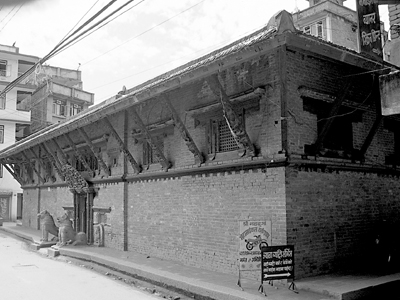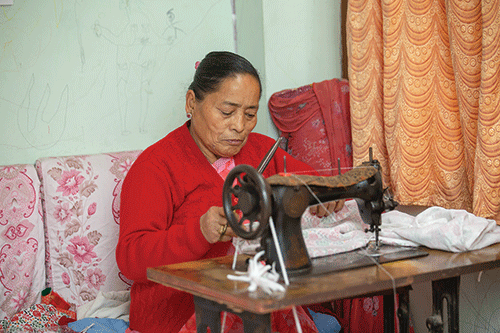Street kids. The term has become so commonplace. A way of numbing the con-science or identifying a nuisance, it almost keeps us from caring. This worldwide phenomenon has not spared Kathmandu.
 Street kids. We’ve all seen them scattered about like driftwood washed up on the beaches of Thamel. Or stumbling around Durbar Marg, in a stupor from sniffing glue. Traveling at night, after social gatherings, we have witnessed them lying side by side, trying to cope, wanting to survive. Not everyone rolls up the window of their compassion and passes by. Some are actively rescuing the disinherited, transforming shadow into sunlight, recycling lives.
Street kids. We’ve all seen them scattered about like driftwood washed up on the beaches of Thamel. Or stumbling around Durbar Marg, in a stupor from sniffing glue. Traveling at night, after social gatherings, we have witnessed them lying side by side, trying to cope, wanting to survive. Not everyone rolls up the window of their compassion and passes by. Some are actively rescuing the disinherited, transforming shadow into sunlight, recycling lives.
Recently, in a boardroom setting, nine serious young men wearing bright green uniforms and red baseball caps with the name of their organization, ‘Prayas’ (‘Effort’), emblazoned proudly on both the left side of their jackets (over their hearts) and on the front of caps (near their brains), held a press conference. This was the official launching of their commercial waste management business, as well as the presentation of new public services: distribution of magazines and newspapers, and payments of water and electric bills. After all, garbage collection goes on from 6 am to 10 am, so their afternoons were free for other projects. These young men come from a variety of castes, and whether it be Kumar Rai, Suman Lama, Buddhi Nepali, Kamal Thapa Magar, Raju Chetri, Amrit Lama, Deepak or Kumar Dalit, they have one thing in common: a desire to improve their destiny. They can taste their dreams being realized: dreams of having a roof over their heads, decent nourishment, and an end to being stigmatized by a society that has treated them with contempt. Their team leader and originator of the group, Rewat Timilsina fielded the questions like a pro, which in fact he is.
HOW REWAT BECAME A STREET KID
Lajun, in east Nepal, is a backwater. But there is one movie house. At 7 years old, Rewat saw his first film and became addicted. Nothing else mattered except the silver screen. Every time a new movie came to town, he “had to go.” Rewat’s troubles escalated when he stole 40 rupees from his single mother’s purse and got caught. Coincidentally, right after that he got into a spat with the daughter of a teacher at the school he was attending. He got a thrashing. He went to a movie which finished at about 10 pm and “didn’t have the guts to go home.” He slept on the street in Birgunj, and was taken under the wing of a group of older (10 to 12-year-old) street kids who, at first, “advised him to return home”. Then he started working with them as a rag picker, earning 10-15 rupees a day. After a few days he went home and although his mother welcomed him, he ran away again after a few months. He hasn’t seen her since. “I don’t even know if I would recognize her,” he says. Rewat liked the freedom of life in the streets. Eating was no problem for him, but how did he keep clean? “Roadside taps,” he smiles. But the bigger dangers were from local street gangs. “They would come to where we were sleeping and ask for money. They were bad guys. They tried to blackmail us into stealing, bully us into picking pockets.” These troubles lasted about four years, and then he and his friends had enough and decided to strike out for the City of Gold: Kathmandu. Lacking enough money, they would get on a bus, ride for half an hour, and “when they came to collect the fare, we’d fly off.”
At first, Kathmandu was “one big amazement”. Rewat feared getting lost. He slept anywhere. He ate anything. He had to be even more on his guard than before. Did he or his friends receive any official help? He shakes his head and then his eyes light up. “In winter, when it was hard to sleep, we’d make a bonfire and sit and talk and tell one another our dreams. A favorite one was digging a tunnel and arriving in the U.S.A. Being like Bill Clinton. We all wanted to live a better life.” His gang stayed together four years, “then went their own way.” Rewat heard from them occasionally about factory work, but he says “I didn’t want reminders of the past.” And destiny had other plans for him. He was tapped for a role in a play concerning street children by the well known street drama group Arohan (‘Ascent’). Not only did he become an actor at age 15, he also found work training street children and teaching them about their rights because he could relate to them. Rewat says they spoke openly about physical and emotional abuse with him, but he is reluctant to say anything about sexual exploitation. (Although this is a well-documented problem for street kids, many are uncomfortable talking about it or even deny its existence.) His advocacy work led him to a two year-stint in a field office in Pokhara with the Child Welfare Society.
STRIKING OUT ON HIS OWN
Rewat looked at his choices in acting or advocacy, and opted for another way. With the help of a friend, he made a proposal to the Child Workers Association of Asia. They’d buy, at a fair price, the waste products collected by street kids. In return they would supply the youngsters with food and lodging. So was born Jagaran Samuha, (Awakening), in 1996. While he managed to get some kids off the streets, inexperience and the “interference of others” shipwrecked his project. He left. His brain started twirling and the result was Jagaran Manch Nepal (JAFON) an NGO which he started with a handful of others, including past pals from the streets. They were encouraged and received financial support— even a gift of 50,000 rupees from a Danish man who had heard about Rewat’s activities. Garbage management was clearly the best option, being a hot-button issue. Since most of them had vast experience in that field, they began to work in Thapathali. With three rickshaws for pick-ups (donated by a Japanese INGO, Saplaneer, connected to the Lion’s Club) and a few workers, Rewat Timilsina, launched himself, and his NGO, into the world of waste. Then the expansion bug hit. Why not become entrepreneurs and earn wages?
THE GURU: ASHUTOSH TIWARI
“When Rewat came to see me, he basically wanted a handout,” says Ashutosh Tiwari, an affable thirty-something who hides a quick, penetrating mind, behind an equally quick smile. One of the few Nepalis to have earned an economics degree from Harvard University (he won a scholarship), his life, which could have been spent with the big bucks boys, altered drastically at a cocktail party in Boston. He met Dilly Chaudhary, the firebrand leader of the fight for equality of the Kamaiyas, the bonded laborers. Inspired by Chaudhary, Ashutosh applied for a grant to work with the Kamaiyas. He spent a year in Dang, in western Nepal. “I was a city boy, Kathmandu pure and simple. I was surprised, terrified. So this was Nepal!” Trained in economics and philosophy, he refused sparkling job offers in the States in order to be of help to his fellow citizens. He stayed in Nepal. “I always felt that injustice was not an option,” he states enthusiastically. With his background and fluency in English, Tiwari was snapped up by the German Development Corporation (GTZ) to head Business Service Aadhar (B.S.A), part of their Private Sector Promotion Project. Here he could use his skills—“The masala of activism and ideals needs some [ingredients] like practicality and knowing what buttons to push in order to make it happen,” in both business and ethics, he explains. Start-up companies can use the B.S.A. platform for advice on marketing, brand identity (recently Tiwari organized a seminar on this subject), customer relations, and the intricacies of “how to succeed in business even in Nepal.” He works very closely with his team of Sanjita Shresta and Sunim Tamang. “There is no hierarchy, only mutual admiration.” What else can you expect of someone who avows that his guidelines come from the book “Emotional Intelligence” by Daniel Goleman, who believes that in the business world, “there is a greater need for collaboration than competition,” and the main issue in poverty is “exclusion and isolation, not depravity.” His suggestion? “Instead of lumping poor people in with other poor people, put them in contact with the rich.”
BUSINESS SCHOOL BEGINS
So last February when Rewat Timilsina knocked on Ashutosh Tiwari’s door (they have a mutual friend) he found, unknowingly, the right address. “Forget NGO. Forget charity,” the business guru said. Rewat listened. “Organize as a team. Wear uniforms so that you will take yourselves seriously and so will others. Get a brand identity.” Thus was born ‘Prayas’. The youths had to learn so many things like social interactions, reliability, accountability, and accounting. Most of the youths have some education (only two are illiterate), so basic math was not a problem. “They have to learn how to put money away in order to buy warm clothing for winter”, observes Tiwari. Its a difficult concept for street kids who had no banks and, rather than risk being robbed, spent every rupee on themselves as well as being generous with others. Its hard for them to plan ahead in general. “It took four months to make a five page contract among themselves”, confides Ashutosh. There were long days and nights and weekends spent in conferring with the would-be entrepreneurs learning confidence in one another. “I took the example of some of the laborers from India, who walk around with tools in their hands showing their desire to be hired. Nepalis, however, walk around with their hands in their pockets. Now what does that show?” he asked the youngsters. Guiding their often complex personalities into a working organization is not an easy matter. Trust issues, such as getting a correct salary, abound. Recently, in dealings with a distribution company, a hard-nosed businessman showed them that the business world is not always tender, and the negotiations fell through. “We didn’t want to lose face’, admits Rewat. And maybe that statement shows why he is determined to make a success of Prayas. A sense of self-worth is a step in the right direction.
At present the young men earn approximately 33,000 rupees a month, about two or three thousand for each worker, “depending on how many hours they put in.” And it might help financially if all of the recipients of their services paid. “Some people don’t pay us, but we will remain patient and in the end they will,” states Amrit calmly. But the reality is that some of the residents of Thapathali are content to toss their mess into the streets and if it were not cleaned up the blame would fall upon Prayas. But the quality of their lives has improved. Most of the youngsters have a room for themselves. About a year ago Rewat got married to Anita KC. “She lived near our office, and we got to know one another, says the young entrepreneur. “We got married, but her father does not accept me so we have not as yet had a religious ceremony, even though she is expecting our child”, he confides, then shrugs. “It doesn’t matter. We are married in our hearts. And everyone else in the family has welcomed us.” What kind of future would he wish for his unborn child? “I always wanted to be a musician, so it would be nice if he or she could study music.” But Rewat nourishes other dreams as well. The movie virus has never left his system. “I hope to become a film director some day, he confides. I played a small role in a telefilm. One film company even said I could have the starring role in a film, if I paid them money…”
FOR THE LONG HAUL
When asked how far he would accompany Rewat and his fellow workers, Ashutosh smiles, determined. “Prayas is not a flavor of the month, one shot deal. We at B.S.A. don’t believe in giving a fish to satisfy an appetite. Instead we supply the line, hook, and sinker. We want to transform need into self-discovery, self-actualization, self-determination. And we would appreciate the community’s support in recycling attitudes,” he concludes.
For more information:
Business Service Aadhar
Phone 4218377 or 4218369
e-mail ashu@aadhar.com.np
Prayas
Rewat Timilsina pager # 9682-18928

Liquid Gold: Nepal's Beer Industry Is Growing And Changing Fast
One need only glance at the beer section of the local liquor store to see that...










